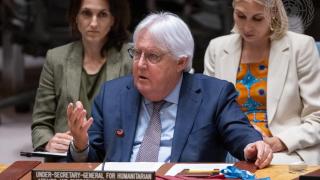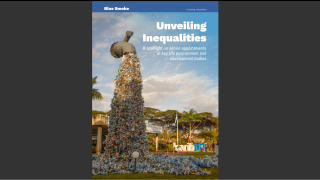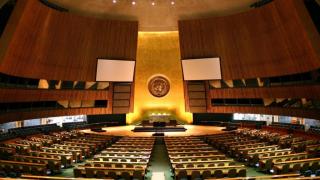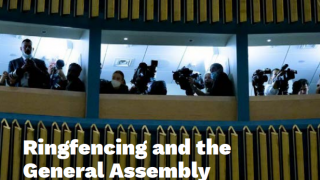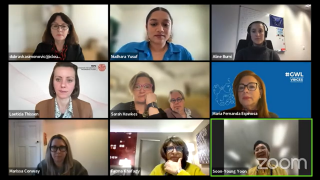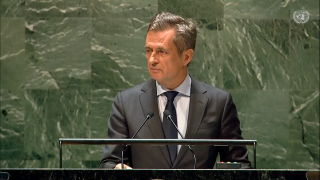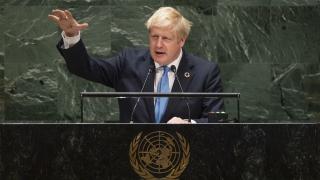
SATURDAY UPDATE:
We understand that no state made any ojection to the President of the General Assembly's comprimise wording and thus the silence procedure has been completed, meaning the declaration can now be adopted.
However, the President of the General Assembly has "been notified of an issue regarding a particular element of the final draft Declaration, which would require further clarification in order to conclude the process". This process of clarification should now take place over the next couple of days, and should not result in any substantive alteration of the text.
Friday update:
Following our statement the President of the General Assembly has suggested compromise wording and re-established the silence procedure with a deadline that has now been extended to 1800 New York Time tonight.
We understand the UK is working hard to find a suitable compromise and to ensure that agreement is reached on a declaration today. We wish them every luck with this important endeavour.
Original statement:
UNA-UK was disappointed to hear that negotiations towards a declaration to commemorate the 75th anniversary of the United Nations have hit a setback, and are particularly disappointed that this setback is due to the actions of the United Kingdom.
The declaration is intended to recommit the members of the United Nations to its founding principles, and to global cooperation for peace, sustainable development and human rights.
It has potential to pave the way for the reform of our international system – to better address the challenges of the future and the task of “building back better” after the Covid-19 pandemic. It would allow member states to demonstrate how they intend to answer the challenge of creating “the world we want and the UN we need”.
It was due to be adopted on Wednesday 24 June provided no country broke the “silence” procedure by registering an official objection – thereby being ready in time for the 75th anniversary of the signing of the UN Charter this Friday.
The United Kingdom’s acting ambassador Jonathan Allen did so, on behalf of the members of the “five eyes” intelligence community (the UK, US, Australia, New Zealand and Canada) and India.
These six countries objected to one phrase towards the end of the declaration:
“to realise our shared vision for a common future”
They wanted this wording replaced with:
“to realize our shared vision for a better future as envisaged in the preamble of the UN Charter”
To an outside observer such an objection might appear trivial. For the declaration, which we have previously argued is a strong draft with a positive and inspiring vision, to falter on such a matter will reinforce many people’s worst suspicions about the United Nations.
Rising populist nationalism is causing people to doubt the purpose and value of international institutions as never before. This declaration, and the wider process of reflection around this significant anniversary, was an opportunity to answer those doubts. Now this opportunity risks being squandered.
This is not just a setback for the United Nations but for the United Kingdom. Ever since the UK first hosted the first ever UN General Assembly “the United Kingdom has been a key partner every step of the way” in the words of previous Secretary-General Ban Ki-moon. In turn, the UK’s standing on the world stage is closely linked to its support for the UN – not least in the status it enjoys as a permanent member of the Security Council.
The UK frequently, and rightly, speaks out against states who act as “spoilers” within the international system by quibbling over minor procedural matters or technical questions of wording. Now, the UK finds itself a part of what the President of the General Assembly has referred to as “a very limited specific element” standing in opposition to 187 of the world’s 193 UN members.
We have heard from a number of sources that the reason the UK and others object is because "shared vision for a common future” bears some similarity to wording used by the Chinese Communist Party (CCP) to describe its foreign policy aspirations. It was famously used in a report by former Chinese Communist Party General Secretary Hu Jintao to the 18th CCP congress in 2012. Thus, the language needs to be viewed in the context of the current great power rivalry between the USA and China, with the UK firmly allying with the US.
However, the phrase itself is much older, and has been ubiquitous in UN documents for many decades, from the 1987 Brundtland Commission Report on Sustainable Development to speeches by the last several Secretaries-General and even the resolution establishing this process last year which the UK supported. Outside of the UN it appears everywhere from the website of the Scouts to the theme for the most recent Commonwealth Summit. The phrase is commonly used by British politicians: Britain’s minister for the UN has done so, as did Theresa May during her time as Prime Minister.
Furthermore, the use of language which has a particular resonance for an individual nation is not in and of itself problematic – the very first words of the UN Charter “We the peoples” originate with the US constitution – and indeed such approaches can help develop useful buy-in from key member states.
The cofacilitators of this process will now have to renegotiate the draft document, and already China, with the support of Russia, Pakistan and Syria, have asked for a meeting. It is our hope that these debates can be restricted to the phrase in question; it would be most regrettable if the UK’s objection was used as cause to reopen discussions on other, more important, issues within the text.
One or both of the two sides will need to show leadership and make concessions. Those parties willing to do so will reflect the spirit of cooperation and compromise that wartime leaders displayed in 1945 when they created the UN, and will demonstrate themselves to be ready to fulfil a major role as the Organization moves into its next 75 years. We hope the UK will take this route.
Photo: Prime Minister Johnson addresses the UN Credit: UN Photo/Cia Pak

